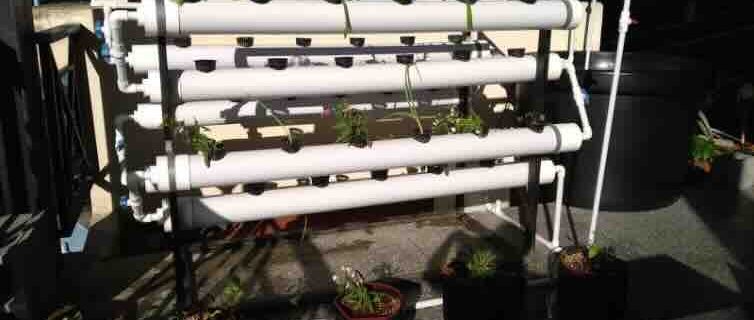On December 1st, 2024, representatives of Aquatik Solutions visited Naparima Girls’ High School to install a small, decoupled hydroponics/aquaponics system on the school’s compound for the Eco-Activists Club.
Hydroponics is a method of growing plants without soil, wherein the plants’ roots are immersed in nutrient-rich water, supplying the necessary nutrients to the plant. This is highly effective and space-saving, especially for areas with limited access to cultivable land or within urban environments. Hydroponics also minimizes the need for pesticides and reduces water waste, as the water is recirculated in a closed system. This makes it both environmentally-friendly and a sustainable farming technique with the potential to produce high yields using fewer resources compared to conventional soil-based agriculture.
Aquaponics is the method of growing plants utilizing fish waste. There is a symbiotic relationship between the amount of food fed to the fishes and the ratio of plants that can be grown. A flood and drain system will be set up with the existing fish tank to enable the growing of fruit bearing plants (tomatoes, hot peppers, bell peppers, etc.) Fish will be introduced into the tank when the system is completely set up.
The representatives from Aquatik Solutions, Rakesh Bhukal and Stephen Jairam along with a student and her family assisted in the construction of the system. All the necessary equipment including PVC pipes, a fish tank, water pump and nutrients were brought to the site. This system was set up in the Waving Gallery, with the goal of providing the school population with a real-world example of modern farming techniques that conserve water and space.
Once the system was constructed, different plants that could be grown were discussed, some including lettuce, herbs, and tomatoes. The organization’s representatives gave brief instructions on how the system works, including how to monitor water levels and water quality, cleaning the pump and filter and ensuring plants receive the right nutrient concentrations. A workshop will be held in term 2 to properly train students of the Eco-Activists Club on the system’s operation. A solar panel will also be added to the system to allow the pump to be partially solar powered.
The project offers a new learning opportunity for students and reinforces the importance of sustainability in agriculture. The Club intends to continue using the system with the intent of showcasing possible alternative methods of farming to adapt to the impending effects of climate change.
The Eco-Activists Club would like to thank Mr. Rakesh Bhukal and Mr. Stephen Jairam of Aquatik Solutions, as well as Brielle and her family for all their help and advice in setting up this exciting new project. Special thanks to our Principal and Vice Principal for all their support in making this project a reality and also especially to BMobile U-Report 2024 for providing us with the funding.
On Monday 13th January, 2025, The Eco-Activists Club hosted Mr. Stephen Jairam and Mr. Rakesh Bhukal and their team from UWI’s Department of Food and Agriculture and Aquatik Solutions for the Hydroponics Training Workshop. Mrs. S. Roopnarinesingh and some members of the Gardening Club, as well as Head of Department of Science, Mrs. T. Persad, were also invited to participate. We were taught about the relevance of Hydroponics to our lives, as well as the proper procedure to take care of the system. Twenty-five red and silver super male tilapia offspring were also introduced into the Aquaculture tank. The participants were given certificates at the end. The session was very informative and interesting. To date, the plants have been growing quite healthy and the Eco-Activists club picked its first hydroponics seasonings on Thursday 16th January, which was given to our Cafeteria personnel. They are also currently naming the fish and learning more about their proper care. We encourage the school body to visit our project and learn about the Hydroponics and Aquaponics system. A gentle reminder to never feed the fishes nor try to touch them and to not water the plants or turn the valves on the unit. Here are some pictures from this term’s activities so far:





